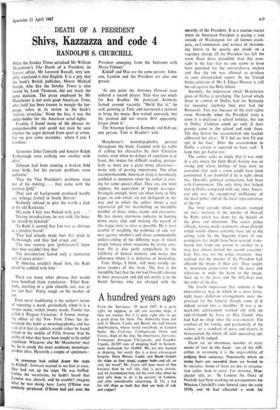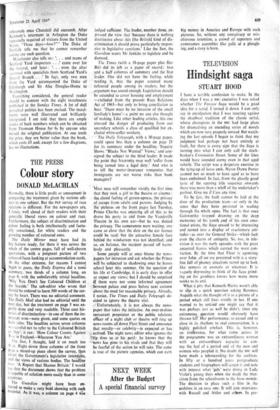-Shivs, Kazzazza and code 4
DEATH OF A PRESIDENT RANDOLPH S. CHURCHILL
When the Sunday Times serialised Mr William Manchester's The Death of a President, its literary editor, Mr Leonard Russell, very sen- sibly translated it into English. It is a pity that the book's British publisher, Messrs Michael Joseph, who like the Sunday Times is also owned by Lord Thomson, did not reach the same decision. The prose employed by Mr Manchester is not even good American. Time, who itself has been known to mangle the lan- guage, refers in its review to the book's 'stylistic atrocities.' None the less, it was the under-bidder for the AMerican serial-rights.
Frankly, I found many of the phrases in- comprehensible and could not even be sure whether the argot derived from sport or crime. Let me give' some examples: where I can, I translate: 'Governor John Connally and Senator Ralph Yarborough were stalking one another with shivs.'
'Johnson had been running a broken field since birth, but his current problems were authentic.'
`Thus the Vice President's problems were not of his making . . . they came with the territory [job].'
`That sort of background produced hardly any mileage [votes] in South Boston.'
'Kennedy refused to give the world a kick in the old Kazzazza.'
'His code 4 hair was flecked with grey . . `During introductions, he was told, the Sena- tor should be benched.'
`To Ruth it seemed that Lee was as obvious as a parchisi board.'
'They had already made their first pitch to Yarborough, and they had struck out.'
'The two veteran pols [politicians?] knew their boss wouldn't buy that.'
`The introduction lacked only a stentorian roll of snare drums.'
`If America couldn't shuck him, the Reds could be saddled with him.'
There are many other phrases that would have benefited from translation: 'Ethel Ken- nedy, startling in a pink chenille suit, was at her tart best.' Pretty rough on the mother of ten.
Even more maddening is the author's terror of repeating a word, particularly when it is a proper name, within twenty words. Fowler has called it 'Elegant Variation.' A former manag- ing editor of the New York Times has de- nounced this habit as monologophobia and has said of it that its addicts would rather be found naked in the middle of Fifth Avenue than be guilty of what they have bear taught to be sinful" repetition. Whatever else Mr Manchester may be, he is surely the most assiduous- monologo- nhohist alive. Herewith a couple of specimens : 'A crewman had - called dowo—the-- steps to Kilduff: Johnson wanted to see him'at once. Mac had run up the steps. He was baffled. Unlike the secretaries, he hadn't heard that Lyndon was aboard, and he couldn't imagine what he was -doing here: Larry O'Brien was similarly perplexed. O'Brien had just seen the
President emerging from the bedroom with Marie Fehmer.'
Kilduff and Mac are the same person: John- son, Lyndon and the President are also one person.
'At one point the Attorney General even ordered a record player. That was too much for Ben Bradlee. He protested. Kennedy looked around vacantly. "She'd like it," he said, pointing at Toni, and instructed a yeoman to bring the music. Ben waited anxiously, but the yeoman did not return. Bob apparently forgot about it.'
The Attorney General, Kennedy and Bob are one person. Toni is Bradlee's wife.
Manchester's monologophobia persists throughout the book. Coupled with his habit of calling his characters .by their Christian names, even when no danger of repetition is at hand, this makes for difficult reading, particu- larly as there are a great many characters— many only of passing importance. The often incomprehensible American slang is fortunately confined to moments when the author is striv- ing for some special effect. They are, one must suppose, the equivalent of 'purple passages.' Strangely enough, there are often forty or fifty pages on end which are not disfigured in this way and in which the author shows a real reportorial gift for marshalling an incredible number of dates, times, events and characters. He has shown enormous industry in hunting down every clue and making the record of this tragic story as clear as possible. He is most careful in weighing the evidence of one wit- ness against another's and shows commendable understanding of the differing ways in which people behave when overcome by strong emo- tion. He is also justly sympathetic to the fallibility of human memory and makes due allowance where it is defective or misleading.
Four things, I think, will most vividly im- press readers of this book. The first is the incredible fact that the Fat had Oswald's dossier in their possession and did not notify it to the Secret Service, who are charged with the security of the President. It is a routine matter when an American President is paying a visit outside of -Washington for all known crack- pots, ex-Communists and writers of threaten- ing letters to be quietly put inside on a vagrancy charge till the President has left the town. Even more incredible than this over- sight is the fact that no one seems to have been punished for the extraordinary neglect and that the Fat was allowed to produce its own whitewashed report. In the United States criticism of Mr J. Edgar Hoover is still the sin against the Holy Ghost.
Secondly, the impression which Manchester gives of Dallas is terrifying. The hatred which those in control of Dallas had for Kennedy far exceeded anything they ever had for Roosevelt. This was because of the civil rights issue. Normally when the President visits a town it is declared a school holiday; but not in Dallas. Children could go only if their parents came to the school and took them. The day before' the assassination one teacher addressed her class: 'If I did see him I'd just spit in his face.' After the assassination in Dallas a citizen is reported to have said: hope they get Jackie too.'
The author seeks to imply that it was only in a city where the John Birch Society was so strong and where feelings of hate were so prevalent that such a crime could have been committed. I am doubtful if he is right about this. Oswald's political connections had been with Communism. The only thing that helped him in Dallas compared with any other Ameri- can city was the exceptional inefficiency of the local police and of the local representatives of the FBI.
The third episode which remains stamped on one's memory is the murder of Oswald by Ruby which was done for the benefit of the press and television. The senior police officials, having made statements about Oswald which would almost certainly have led to the setting aside by the Supreme Court of any conviction that might have been secured, trans- ferred him from one prison to another in a way that almost invited the second assassina- tion. This was not the police intention: they realised that the murder of the President had affected the image of their city. They sought by maximum cooperation with the press and television to undo the harm to the image. Suck up to the press and the telly-boys was the order of the day.
The fourth impression that remains is the extraordinary way in which in a mere forty- eight hours elaborate arrangements were im- provised for the funeral, though some of it indeed turned into a shambles. It was a re- markable achievement worked out with no rule-of-thumb by forty or fifty friends who had hid no sleep since the assassination. The conduct of the family, and particularly of the widow, set a standard of poise and dignity in bereavement by which all such succeeding epi- sodes will be judged.
There are an enormous number of state- ments of fact in this book: one of the diffi= culties in reviewing it is the impossibility of judging their,--accuracy: Necessarily where so- . many-facts area recorded there-are- bound -to be mistakes. Some of them are due to imagina- tion rather than to error. For instance, Man- chester tells us: 'In London the Duke of Norfolk had been working on arrangements for Winston Churchill's state funeral since the-early 1950s and he had allocated a week for rehearsals once Churchill did succumb. After Kennedy's interment in Arlington the Duke repeatedly inquired of visitors from the United States, "Three days—how?"' The Duke of Norfolk tells me that he cannot remember asking any such question.
Manchester also tells us: . . and teams of Scotland Yard inspectors . . .' came over for
the funeral, and later: . . even the altar swarmed with specialists from Scotland Yard's Special Branch . . In fact, only two men from the Yard accompanied the Duke of Edinburgh and Sir Alec Douglas-Home to Washington.
Everything considered, the general reader should be content with the eight instalments published in the Sunday Times. A lot of dull parochial politics has been excised. The instal- ments were well illustrated and brilliantly interpreted. I am told that there are ample stocks of back numbers which can be obtained from Thomson House for 6s by anyone who missed the original publication. At one tenth the price, they are better value than the book, which costs f3 and, except for a few diagrams, has no illustrations.







































 Previous page
Previous page